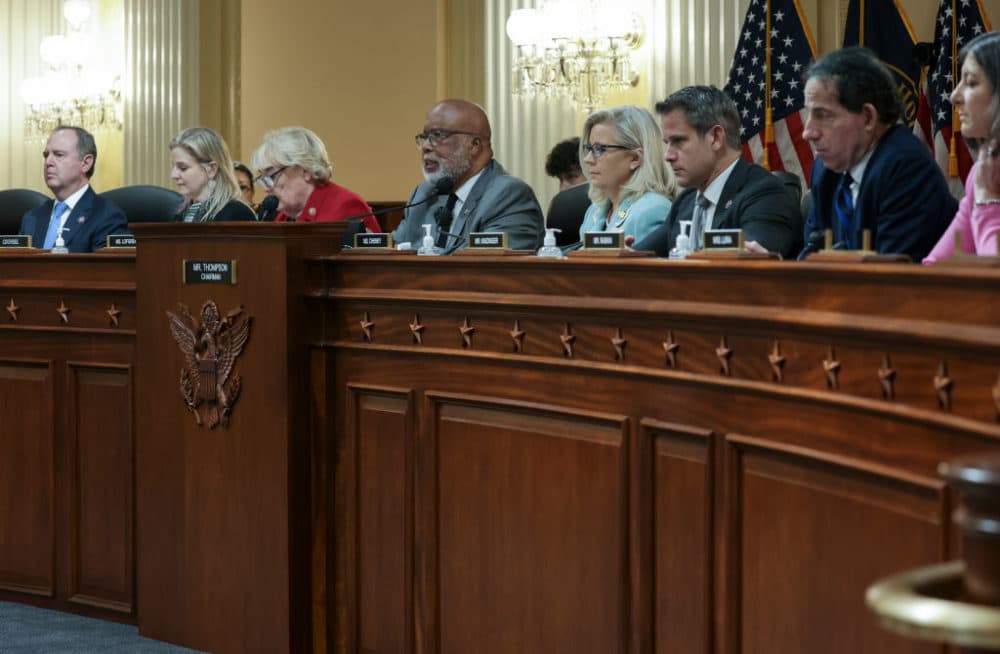Advertisement
Jan. 6th hearing: Will the committee's message break through to the American people?
Resume
Congress's January 6th select committee is broadcasting its hearings directly to Americans.
But the committee is also making it clear — this isn't only a retrospective investigation.
Today, On Point: With partisan gaps widening, and fewer people saying Trump is responsible for the attack on Congress, can the hearings break through with the American people?
Guests
Lisa Desjardins, correspondent for PBS NewsHour. (@LisaDNews)
Steven Levitsky, professor of government and director of the David Rockefeller Center for Latin American Studies at Harvard University. Co-author of How Democracies Die.
Jack Beatty, On Point news analyst. (@JackBeattyNPR)
Interview Highlights
On how Jan. 6th threatens American democracy
Steven Levitsky: “We're in great danger, any time in a two-party system one of the two major parties, a party that is perfectly capable of winning elections, is not fully committed to democracy. Democracy is at risk. And in our work, Daniel and I use two very simple criteria to evaluate whether a party is committed to democracy. One, do you accept the result of elections? And two, do unambiguously reject political violence? Democratic political parties must always accept defeat, and must always reject violence. And today, you cannot say that the Republican Party meets either of those criteria. So, yes, our democracy, as long as the Republican Party is ambiguous in its support for democracy, our democratic system is going to be in peril.”
Lisa, you were in the Capitol on Jan. 6th. What stands out most to you?
Lisa Desjardins: “Well, I think two things. I think in terms of the substance of the hearing, it has really been impressed upon me that this is about former President Trump. It is very focused on the case about his role, his words, his defiance of reality, all of that. Like I knew that he would be central to these hearings, but I didn't know that he would really be almost the sole focus of these hearings. That was something that stood out to me.
"And then on a more emotional level, in the first hearing, in the back of the room were a few dozen members of Congress. And about 20, 24 members of Congress were there for that first hearing in that primetime hearing. And, you know, they most of them were pretty stone faced throughout. But when the video was rolling, I saw a freshman member of Congress who I know was in the chamber on January 6th, who had never seen any of the video, she told me later, rocking back and forth, trying not to sob, you know. And I talked to her, and I talked to another member afterward. And, you know, they told me something that I'm not going to forget.
"This one member said, I said, Why was that so gripping? I see that you were really holding back your emotion in there. And this member said, because all of those people I saw in that video, those are everyone around us, you know, those could be my neighbors. Those could be anyone. And I don't know how to figure out where the threat is coming from, because it could be anyone. Those look like everyday Americans to me. And I'm nervous because now I see the threat everywhere. You know, that's not to say I don't feel that way. But members of Congress were seeing the video that way.”
On political playbooks in countries that are sliding into authoritarianism
Steven Levitsky: “One of the real warning signs today, I think, is the Republican Party's flirtation with toleration of paramilitary activity, militias, activists who engage — sometimes politicians themselves — who engage in violent rhetoric and sometimes violent actions. In a democracy, mainstream political parties must unambiguously reject violence on all sides, at all times.
"And what you see in democratic breakdowns in Europe, in the 20s and 30s, in South America, in the 60s and 70s, you often see a period in which there's a rise in paramilitary activity that is tolerated, sometimes justified, sometimes condoned by mainstream political parties. And when mainstream parties tolerate violence, that's a bad sign.”
What are some other examples that might make this more concrete for us?
Steven Levitsky: “Akin to Fidesz, the ruling party in Hungary. Akin to the BJP, the governing party in India. Akin to the AKP, the ruling party today in Turkey. These are parties that are cooperating with and supporting authoritarian governments. And there are studies that show that the positions taken by the Republican Party today are far closer to the either European far right parties or the three authoritarian parties I just listed.
"Much closer to those parties than they are to any European Conservative Party. So 25 years ago, the Republican Party was a little bit to the right of the British Tory Party, or the Canadian Conservative Party, or the Christian Democrats in Germany. But it was in that territory. Today is nowhere near those parties. Today is much closer to Fidesz, to Law and Justice in Poland, to the BJP in India, to the AKP in Turkey.”
On lessons for America from the political crisis in Ukraine
Steven Levitsky: “When we mention Ukraine, we're not talking about Ukraine at war. So much as Ukraine went through a period of about 25 years after the collapse of communism in which it slid back and forth in between kind of weak, dysfunctional democratic governments and authoritarian leaning governments, depending on who won the election. Because one political force was more authoritarian, the other was more democratic leaning. But the country just sort of slid in and out of crisis.
"And it had periods of weak, dysfunctional democracy. It had periods of kind of weak, unstable authoritarianism. But the common thread was sort of common repeated institutional crises. And that's where I think we're headed. No party in the United States is strong enough to impose an outright autocracy, nobody strong enough to be a Putin or even an Orban. The opposition is too strong for that. So what we're headed for, I think, is stalemate. And stalemate between one party that's Democratic and one party that's authoritarian is going to be ugly. It's going to lead to frequent political crises.”
Related Reading
Foreign Affairs: "America’s Coming Age of Instability" — "When Joe Biden was sworn in as president a year ago today, many Americans breathed a heavy sigh of relief. President Donald Trump had tried to steal the election, but he had failed. The violent insurrection he incited on January 6, 2021, had shaken the United States’ democratic system to its core, but left it standing in the end."
This program aired on June 14, 2022.

